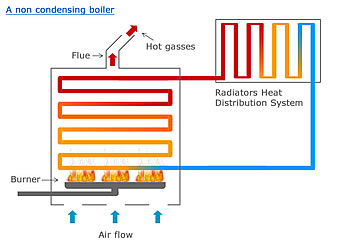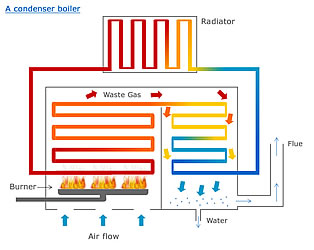Condensing Boilers
Heating and providing hot water for our homes accounts for over half of what we spend on your energy bills.
Condensing boilers are modern and highly efficient boilers that use less fuel and therefore have lower running costs than conventional boilers.
Conventional boilers expel a lot of waste energy as hot vapour out of their flu. Condensing boilers make use of the heat from the exhaust gases that would otherwise be expelled through the flue.
Heat from these hot gases is absorbed within the boiler and used to provide additional heat energy. This is mostly achieved by using an extra-large heat exchanger or possibly two heat exchangers, which helps heat transfer from the burner, and also allows useful heat from the waste gases to be recovered instead of being lost through the flue.


Diagrams showing a non-condensing boiler & a condensing boiler
As the condenser absorbs the vapour’s heat, water and condensation will form before being expelled in the form of steam from the flue. Consequently the gas temperatures when leaving the flue of a condensing boiler are usually 50 to 60 degrees centigrade, compared to 120 to 180 degrees centigrade in a traditional non-condensing boiler.
Considerations
Types of fuel – Condenser boilers are available for use with gas, LPG and oil
Condensing boilers also produce carbon dioxide and other pollutants – Although condenser boilers when compared to traditional boilers are more efficient and will therefore reduce your fuel bills and carbon emissions, they do still require expensive non-renewable fuels and produce carbon dioxide. Before installing a condensing boiler, check to see if there are better options available to you. These may include a micro-CHP boiler or a ground source heat pump.
Regulations
Since 2005 any new gas boiler installed in your home has to be a high efficiency condensing boiler. In most homes since October 2010 the boiler would also have to be A rated or 88% efficient. Therefore if you replace your boiler today for a new one, it will most probably have to be an A rated condenser boiler.
When replacing your old boiler for a new condenser boiler it is important to ensure that you also replace your old heating controls for the correct new ones, otherwise you may not obtain the best heating efficiency for your home and hot water.
The advantages of a condensation boiler
- Greater efficiency – a condenser boiler can be up to 12% more efficient than a non-condensing boiler. This will reduce running costs and also CO2 emissions.
- Easily installed – If replacing an old boiler it is normally a simple change over.
- Reliable and easy to maintain – A condensing boiler is as reliable as a traditional boiler and also requires very similar servicing.